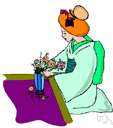dis·turb
(dĭ-stûrb′)tr.v. dis·turbed, dis·turb·ing, dis·turbs
1. To break up or destroy the tranquility, order, or settled state of: "Subterranean fires and deep unrest disturb the whole area" (Rachel Carson).
2. To trouble emotionally or mentally; upset: It disturbed me when you left without saying goodbye.
3.
a. To interfere with; interrupt: noise that disturbed my sleep.
b. To intrude on; inconvenience: Constant calls disturbed her work.
4. Physics To alter or displace a region of (a medium) from its equilibrium state.
[Middle English distourben, from Old French destourber, from Latin disturbāre : Latin dis-, dis- + Latin turbāre, to agitate (from turba, confusion, probably from Greek turbē).]
dis·turb′er n.
dis·turb′ing·ly adv.
American Heritage® Dictionary of the English Language, Fifth Edition. Copyright © 2016 by Houghton Mifflin Harcourt Publishing Company. Published by Houghton Mifflin Harcourt Publishing Company. All rights reserved.
disturb
(dɪˈstɜːb)vb (tr)
1. to intrude on; interrupt
2. to destroy or interrupt the quietness or peace of
3. to disarrange; muddle
4. (often passive) to upset or agitate; trouble: I am disturbed at your bad news.
5. to inconvenience; put out: don't disturb yourself on my account.
[C13: from Latin disturbāre, from dis-1 + turbāre to confuse]
disˈturber n
Collins English Dictionary – Complete and Unabridged, 12th Edition 2014 © HarperCollins Publishers 1991, 1994, 1998, 2000, 2003, 2006, 2007, 2009, 2011, 2014
dis•turb
(dɪˈstɜrb)v.t.
1. to interrupt the quiet, rest, or peace of; bother; unsettle.
2. to interfere with; interrupt; hinder.
3. to interfere with the arrangement or order of: to disturb the papers on a desk.
4. to perplex; trouble.
v.i. 5. to cause disturbance to someone's sleep, rest, etc.
[1175–1225; Middle English disto(u)rben < Anglo-French disto(u)rber < Latin disturbāre to demolish, upset]
dis•turb′er, n.
Random House Kernerman Webster's College Dictionary, © 2010 K Dictionaries Ltd. Copyright 2005, 1997, 1991 by Random House, Inc. All rights reserved.
disturb
– disturbed1. 'disturb'
If you disturb someone, you interrupt what they are doing and cause them inconvenience.
If she's asleep, don't disturb her.
Sorry to disturb you, but can I use your telephone?
2. 'disturbed'
The adjective disturbed has a different meaning. A disturbed person is very upset emotionally and often needs special care or treatment. When disturbed has this meaning, it comes in front of a noun.
They help emotionally disturbed youngsters.
If someone is disturbed, they are very worried. When disturbed has this meaning, it comes after a linking verb.
He was disturbed by the news of the attack.
Collins COBUILD English Usage © HarperCollins Publishers 1992, 2004, 2011, 2012
disturb
Past participle: disturbed
Gerund: disturbing
| Imperative |
|---|
| disturb |
| disturb |
Collins English Verb Tables © HarperCollins Publishers 2011
ThesaurusAntonymsRelated WordsSynonymsLegend:
| Verb | 1. |  disturb - move deeply; "This book upset me"; "A troubling thought" disturb - move deeply; "This book upset me"; "A troubling thought"charge up, commove, agitate, rouse, excite, turn on, charge - cause to be agitated, excited, or roused; "The speaker charged up the crowd with his inflammatory remarks" jolt - disturb (someone's) composure; "The audience was jolted by the play" cark, disorder, disquiet, perturb, unhinge, distract, trouble - disturb in mind or make uneasy or cause to be worried or alarmed; "She was rather perturbed by the news that her father was seriously ill" impress, strike, affect, move - have an emotional or cognitive impact upon; "This child impressed me as unusually mature"; "This behavior struck me as odd" distress - cause mental pain to; "The news of her child's illness distressed the mother" |
| 2. |  disturb - change the arrangement or position of disturb - change the arrangement or position oftoss - agitate; "toss the salad" poke - stir by poking; "poke the embers in the fireplace" | |
| 3. |  disturb - tamper with; "Don't touch my CDs!" disturb - tamper with; "Don't touch my CDs!" alter, change, modify - cause to change; make different; cause a transformation; "The advent of the automobile may have altered the growth pattern of the city"; "The discussion has changed my thinking about the issue" upset - disturb the balance or stability of; "The hostile talks upset the peaceful relations between the two countries" violate - destroy; "Don't violate my garden"; "violate my privacy" | |
| 4. | disturb - destroy the peace or tranquility of; "Don't interrupt me when I'm reading" | |
| 5. | disturb - damage as if by shaking or jarring; "Don't disturb the patient's wounds by moving him too rapidly!" damage - inflict damage upon; "The snow damaged the roof"; "She damaged the car when she hit the tree" |
Based on WordNet 3.0, Farlex clipart collection. © 2003-2012 Princeton University, Farlex Inc.
disturb
verb
1. interrupt, trouble, bother, startle, plague, disrupt, put out, interfere with, rouse, hassle, inconvenience, pester, intrude on, butt in on I didn't want to disturb you.
2. upset, concern, worry, trouble, shake, excite, alarm, confuse, distress, distract, dismay, unsettle, agitate, ruffle, confound, unnerve, vex, fluster, perturb, derange, discompose He had been disturbed by the news of the attack.
upset calm, relieve, reassure, settle, quiet, relax, compose, soothe, lull, pacify, quieten
upset calm, relieve, reassure, settle, quiet, relax, compose, soothe, lull, pacify, quieten
3. muddle, disorder, mix up, mess up, disorganize, jumble up, disarrange His notes had not been disturbed.
Collins Thesaurus of the English Language – Complete and Unabridged 2nd Edition. 2002 © HarperCollins Publishers 1995, 2002
disturb
verb2. To impair or destroy the composure of:
agitate, bother, discompose, disquiet, distract, flurry, fluster, perturb, rock, ruffle, shake (up), toss, unsettle, upset.
Informal: rattle.
The American Heritage® Roget's Thesaurus. Copyright © 2013, 2014 by Houghton Mifflin Harcourt Publishing Company. Published by Houghton Mifflin Harcourt Publishing Company. All rights reserved.
Translations
يُزْعِجُيُزْعِج، يُشَوِّشيُعَكِّرُ صَفْو، يُهيِّجيُقْلِق
rušitvyrušovatznepokojitrozbouřitrozrušit
forstyrreforurolige
häiritä
uznemiriti
gera bilt viîraska, róta í, ÿfatrufla, ónáîa
邪魔をする
방해하다
ardymasdrumstimassudrumstisujauktitrukdymas
radīt nekārtībassajaukttraucētuztraukt
rozbúriť
motiti
störa
รบกวน
rahatsız etmeküzmekhuzurunu bozmakkarıştırmak
quấy rầy
disturb
[dɪsˈtɜːb] VT1. (= bother) [+ person, animal] → molestar
"please do not disturb" → se ruega no molestar
sorry to disturb you → perdona la molestia
try not to disturb Joseph, he's asleep → intenta no despertar a Joseph, está durmiendo
"please do not disturb" → se ruega no molestar
sorry to disturb you → perdona la molestia
try not to disturb Joseph, he's asleep → intenta no despertar a Joseph, está durmiendo
2. (= interrupt) [+ order, balance] → alterar; [+ meeting, sleep] → interrumpir; [+ silence] → romper
a car alarm disturbed her sleep → una alarma de coche interrumpió su sueño or la despertó
to disturb the peace (Jur) → alterar el orden público
they disturbed a burglar breaking into their house → sorprendieron a un ladrón que estaba intentando entrar en su casa
her constant questions disturbed his concentration → sus constantes preguntas le impedían concentrarse
a car alarm disturbed her sleep → una alarma de coche interrumpió su sueño or la despertó
to disturb the peace (Jur) → alterar el orden público
they disturbed a burglar breaking into their house → sorprendieron a un ladrón que estaba intentando entrar en su casa
her constant questions disturbed his concentration → sus constantes preguntas le impedían concentrarse
Collins Spanish Dictionary - Complete and Unabridged 8th Edition 2005 © William Collins Sons & Co. Ltd. 1971, 1988 © HarperCollins Publishers 1992, 1993, 1996, 1997, 2000, 2003, 2005
disturb
[dɪˈstɜːrb] vt (= inconvenience, interrupt) [+ person] → déranger; [+ sleep] → troubler
sorry to disturb you → excusez-moi de vous déranger
to disturb the peace (LAW) → troubler l'ordre public
sorry to disturb you → excusez-moi de vous déranger
to disturb the peace (LAW) → troubler l'ordre public
(= disarrange) [+ papers] → déranger
[+ burglar] → surprendre
Collins English/French Electronic Resource. © HarperCollins Publishers 2005
disturb
vt
(= interrupt) person, sleep, silence, balance → stören; the pain disturbed my sleep → vor Schmerzen habe ich schlecht geschlafen; sorry to disturb you → entschuldigen Sie bitte die Störung
(= alarm) person → beunruhigen
waters → bewegen; sediment → aufwirbeln; papers → durcheinanderbringen; (fig) peace of mind → stören; to disturb the peace → die Ruhe stören
Collins German Dictionary – Complete and Unabridged 7th Edition 2005. © William Collins Sons & Co. Ltd. 1980 © HarperCollins Publishers 1991, 1997, 1999, 2004, 2005, 2007
disturb
[dɪsˈtɜːb] vta. (bother) → disturbare, importunare; (inconvenience) → scomodare
sorry to disturb you → scusi se la disturbo
"please do not disturb" → "non disturbare"
sorry to disturb you → scusi se la disturbo
"please do not disturb" → "non disturbare"
b. (worry, person) → turbare; (disrupt, sleep, order, meeting) → turbare, disturbare; (ruffle, water) → turbare
c. (disarrange, papers) → scompigliare; (move) → spostare
Collins Italian Dictionary 1st Edition © HarperCollins Publishers 1995
disturb
(diˈstəːb) verb1. to interrupt or take attention away from. I'm sorry, am I disturbing you?
2. to worry or make anxious. This news has disturbed me very much.
3. to stir up or throw into confusion. A violent storm disturbed the surface of the lake.
diˈsturbance noun1. a noisy or disorderly happening. He was thrown out of the meeting for causing a disturbance.
2. an interruption. I've done quite a lot of work, despite several disturbances.
3. an act of disturbing. He was arrested for disturbance of the peace.
Kernerman English Multilingual Dictionary © 2006-2013 K Dictionaries Ltd.
disturb
→ يُزْعِجُ rušit forstyrre stören ενοχλώ molestar, perturbar häiritä déranger uznemiriti disturbare 邪魔をする 방해하다 storen forstyrre zaniepokoić perturbar отвлекать störa รบกวน rahatsız etmek quấy rầy 扰乱Multilingual Translator © HarperCollins Publishers 2009
disturb
v. perturbar, incomodar, molestar, inquietar.
English-Spanish Medical Dictionary © Farlex 2012